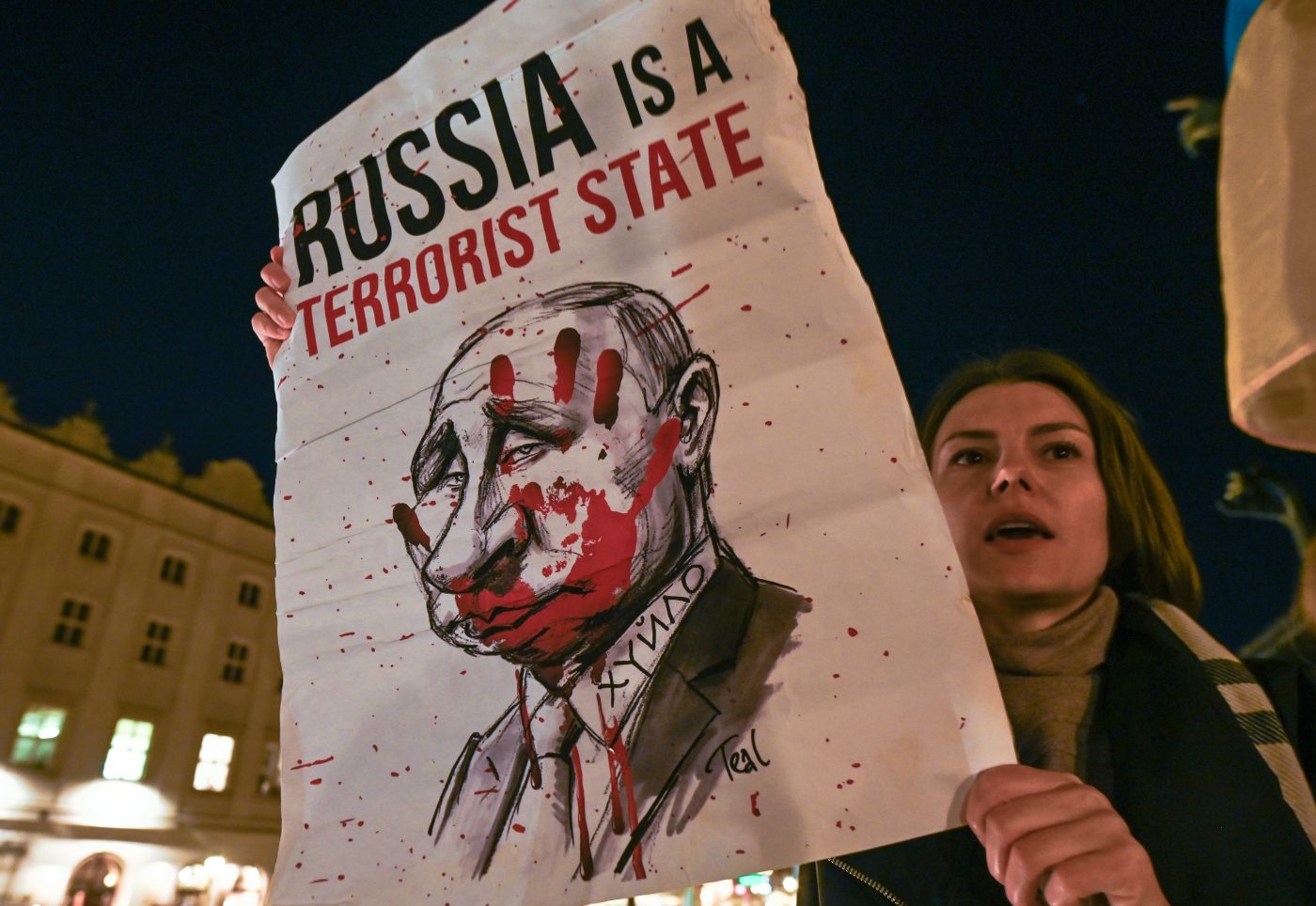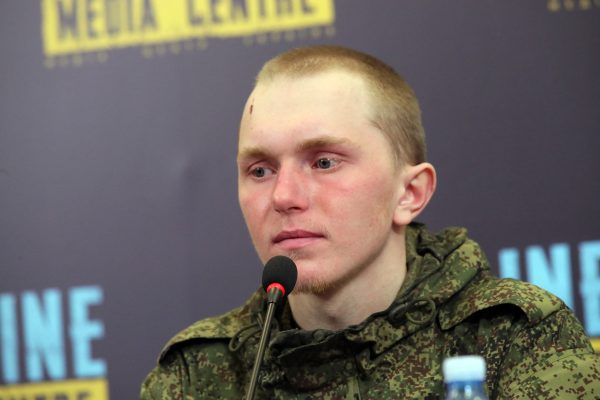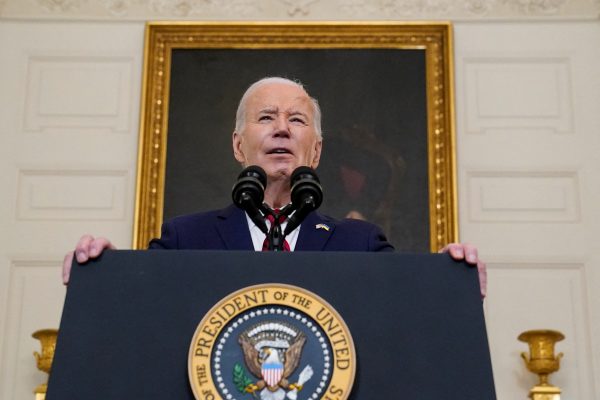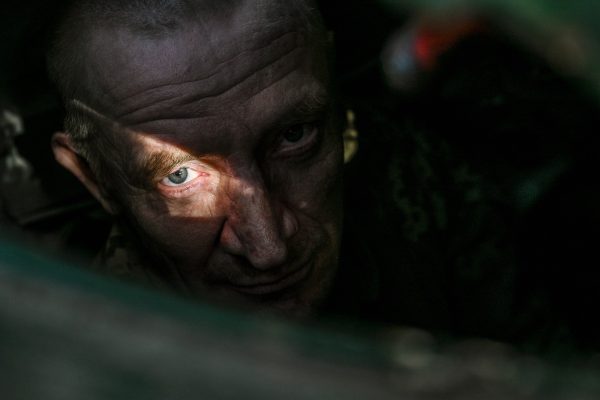Meta, the parent company of Facebook, has now earned a spot on Russia’s list of terrorist organizations, alongside the Taliban, the Caucasian Emirate, and the Islamic State group.
Business with the company is now illegal and any references in media must be followed by an asterisk explaining the designation. The charge against Facebook came not from its long struggles to tamp down on jihadis, but instead from its policy allowing Ukrainians to express violent sentiment towards Russian invaders, which the State Duma labeled “russophobia.” From UN declarations to rationalizing the invasion of Ukraine, Russian media and officialdom paints a picture of a world in which global politics is driven above all by anti-Russian prejudice.
The Russian state’s capacity to maintain its control through coercive means has been on full display since the invasion, but in the preceding decades, the Putin regime relied heavily on media and technology to position challenges to its power as beyond the bounds of socially acceptable speech.
The presentation of russophobia as an all-explaining force behind geopolitical events serves this purpose. By equating opposition to Kremlin policy with irrational anti-Russian feelings, Putin melds the state and the nation. By extension, opposition to the state can only come from opposition to the nation. This makes dissent socially taboo — Putin’s policies are so self-evidently beneficial to the Russian people that only those who wish ill on them could disagree with their president. So it is that those Russians appalled by the reckless aggression of a bloody regime which isolates them from the rest of the world, and threatens to impoverish the country, are described as traitors.
The alleged — and sometimes real — discrimination faced by ethnic Russian in the former Soviet states has been a constant theme of Putin’s rule. Yet the examples highlighted are often clumsily chosen and generate disproportionate responses. When Estonia moved a statue of a Soviet soldier from Tallinn’s central square in 2007, the frenzy whipped by Russian leadership triggered the largest cyber-attack in history up to that point.
Russia’s justification for both the annexation of Crimea and its fomenting of secession in Donbas stemmed from Ukraine’s supposed efforts to eliminate the Russian language and identity. But Putin’s first use of the term russophobia in an official setting came only in 2019, at an informal CIS summit, where he portrayed interwar Poland as riven by “russophobia, antisemitism, and so on” (and followed this with a dramatic and ominous warning — “Aggressive nationalism always makes one blind and eliminates any and all moral boundaries.”)
The term would not become a fixture in Russian media until 2021, however, as the regime began to prepare the population for war. Putin’s rambling revisionist piece, On The Historical Unity of Russians and Ukrainians, from last year, includes the term and uses it to explain why the outside world wrongly regards Russians and Ukrainians as separate peoples. The term then began to proliferate, preparing audiences for Putin’s December 2021 remarks that Ukrainian actions in Donbas amounted to genocide, which, as this author wrote last year, marked the point of no return on the path to war. By 2022, russophobia had become the lens through which Russian media and leadership filtered all geopolitics.
By associating opposition opinions with simple hatred, the regime effectively delegitimizes avenues of dissent. And the portrayal of outsiders as gripped by an animalistic hatred so strong that they become immune to logic, has helped to build solidarity: only those within can be trusted, what the outsiders say is without logic.
While the early days of the invasion saw in the West high profile anti-Russian actions borne of ignorance — the trashing of Russian-owned bars and the cancellation of Tschaikovsky performances among other bigoted acts — the attempt to equate Russian policy with the Russian people is fundamentally flawed. It is hardly irrational to observe that Putin’s policies have robbed the nation of its greatness.
Indeed it is those of us, like this author, who care most deeply about Russians, those who have been engrossed in the novels of Zamyatin and Lemontov, awestruck by a Rachmaninoff vesper or a Prokofiev ballet, astounded by the hardships endured by the Russian people, the human tragedies experienced, the incredible perseverance, who are most disturbed by Putin’s bloody policies.
As a result, thousands of soldiers from Russia, and tens of thousands of ethnic Russians civilians in Kharkiv and Chernihiv and Mariupol, along with their ethnic Ukrainian, Tatar, Greek, and Jewish brethren, now lie dead. A generation of Ukrainians will grow up with a firsthand, unshakeable certainty that Russians are brutal and vicious occupiers.
The world is full of bigotries and there certainly are those that would like to see russophobia spread. They have no greater ally in their goals than the man in the Kremlin.
Ben Dubow is CTO and founder of Omelas, a firm that provides data and analysis on how states manipulate the web to achieve their geopolitical goals, and Non-resident Fellow with the Democratic Resilience Program at the Center for European Policy Analysis.
Europe’s Edge is CEPA’s online journal covering critical topics on the foreign policy docket across Europe and North America. All opinions are those of the author and do not necessarily represent the position or views of the institutions they represent or the Center for European Policy Analysis.





